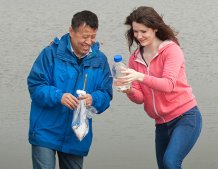Articles

Dr Anne Leonard (right) collecting seawater samples
Rising stars in antibiotic resistance research awarded Industrial Fellowships
Two talented young researchers at the University of Exeter Medical School’s European Centre for Environment and Human Health, have been awarded prestigious Industrial Innovation Fellowships by the National Environment Research Council (NERC).
In World Antibiotic Awareness Week, rising research stars Dr Anne Leonard and Dr Aimee Murray have both received awards to carry out innovative studies into antibiotic resistance – widely recognised as one of the greatest health challenges of our time.
Many bacteria are becoming resistant to commonly prescribed antibiotics. It threatens our ability to treat common infectious diseases such as pneumonia, tuberculosis, blood poisoning, gonorrhoea, and food and waterborne diseases.
The evolution of resistant bacteria occurs naturally – but it is exacerbated by a number of factors, including the overuse and misuse of antibiotics in medicine. Resistant bacteria are also released into the natural environment. For example, streams, rivers and seawater can be contaminated via run-off from farms that use manure, and from sewage.
The Industrial Innovation Fellowship Programme is run by NERC through Research Councils UK, and is supported by the National Productivity Investment Fund. It targets the best and brightest early career researchers who have the potential to become future research leaders at the interface of academia and industry.
Dr Leonard is investigating the pollution sources which contribute to the release of antibiotic resistant bacteria in bathing waters. She said: “By understanding the reasons for increased resistance in bathing waters, we can inform mitigation strategies for reducing pollution of these important environments. Our research has shown that there is a real risk of people who enjoy water sports in bathing waters are at risk of exposure to resistant bacteria. The results of this research have global impact in terms of understanding where resistant bacteria come from and how they get into surface waters and human populations. It’s essential that people continue to enjoy our countryside and waterways, and that we have a clear understanding of the level of risk that resistant bacteria in the environment have on human health.”
Dr Murray is focusing on developing a test to assess whether antibiotic residues in water, from human and animal excretion, drive the evolution of antibiotic resistance– the first test of its kind. She said: “It’s great that water companies are engaging with this research, as we need to understand how antibiotic resistance evolves and whether environmental residues of antibiotics are important or not in driving increases in resistance”
Dr Will Gaze, who is advising both researchers, said: “We know that spending time in coastal environments is good for health and wellbeing, and we would encourage people to continue those activities. However, it’s essential that we understand the extent of the issue of antibiotic resistance in relation to our environment, and that we minimise any impact it may have.”
Date: 14 November 2017
